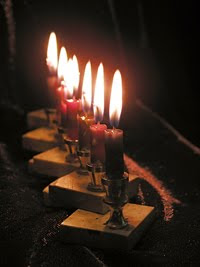Last week at the Kotel, I asked an elderly man to put on tefillin. He strongly refused.
I asked him, “When was the last time you put on tefillin?”
He smiled and proudly said, “Seventy-two years ago!” pushing aside any possibility of him putting them on again. He held out his arm to show me the fading numbers tattooed there. “1938,” he said. “It was the day of Kristallnacht. Do you know what Kristallnachtis?”
“Of course I do,” I told him.
“Two hundred and sixty seven synagogues were burned down in one night. They burned down our synagogue, too. My tefillin were burnt up, and I have never put them on again.” He said, telling me in no uncertain terms why he was not going to put them on.
“I have a friend who was in the camps, too,” I quickly said, “and he not only puts on tefillin today, but he even put them on others inside the camp!” I was trying to show him that he did not have to reject tefillin because of what those evil people did. “Do you want hear how he got the tefillin into the camp?”
“Yeah,” he said, strongly, “How did he get them in there?”
“His name is Laibel. Whenever he comes to Israel, he prays with our sunrise minyan. He also has numbers tattooed on his arm. “When we first met, he asked me, ‘What do you do around here?’
“Wanting to say something exciting, I said, ‘I put tefillin on people here at the Kotel.’
“‘Oh yeah?’ he said, ‘Well, I put tefillin on people in the death camp.’
“I stared at him; there was nothing I could say. I was him dumbfounded. I asked him, ‘How did you get the tefillin in there?’
"He looked me in the eye and said that they came to the ghetto and grabbed 137 young boys. He told me that only five of them got out of there alive, only five.
“He was thirteen-and-a half years old. When they grabbed him, he was wearing the high boots that his father had bought for him. He showed me with his hand that the boots came up almost to his knees. When he saw them coming, he stuffed his tefillin in the top of one boot and his prayer book in the other.
"They pushed the boys into a cattle car and drove them to the death camp. It was not far from the ghetto. When the train stopped, they slid open the side of the cattle car and immediately began pushing them toward the open door of the oven. The boys were frightened and crying out. They asked Laibel, ‘What should we do?’ He told them, ‘I’ll tell you what we’re going to do. We’re going to stand in rows five across and we’re going to march right into that oven singing “ani ma’amin . . . “(I believe in G-d). And they did just that. They stood in rows five across and started singing and marching right into the oven.
“The guards became so confused that they did not know what to do. They screamed, ‘You can’t do that! No one has ever done such a thing before. Stop it! Stop it at once! Here! Go over there to the showers instead.’
“They pushed them over to the showers. They made them take off all of their clothing and throw them into a pile in the middle of the floor. They made them empty out their shoes and the tefillin and prayer book fell out onto the pile.
“After the shower, when they were dressed in the camp clothes and were being pushed back past the pile of their clothes, he saw his tefillin and prayer book lying there. He wanted so badly to run over and pick them up, but there were terrifying guards standing right there so he couldn’t. He said to the boys, ‘Okay, I did something for you, so now you do something for me.’
“‘Whatever you want,’ they said. ‘You saved our lives.’
“He said, ‘When I give the signal, make a big fight with each other and start screaming out loud. Okay . . . Now!’ He whipped his arm in the air as if he was back at the camp giving them the signal. The boys started to fight and scream. The guards ran over and tried to pull them apart, but they wouldn’t stop fighting. In the confusion, he ran over and grabbed his tefillin and prayer book and hid them under his arms.
“He was in the barracks and he wanted to put on the tefillin. He was able to put the arm piece on without anyone seeing by pulling his sleeve over it, but how could he put on the head piece? There were evil guards all over the place. He opened the window and stuck his head outside so he could put on the head piece. A guard came by and screamed at him, ‘Who said you could open that window?’ He told him that he was sick and was throwing up, and if he made him close the window he would throw up inside, too. The guard left him there. And he looked me in the eye and said, ‘And I put tefillin on other men like that there, too.’ I started to cry and I kissed him on his yarmulke.
"The next day there was a soldier at the Kotel who wouldn’t put on tefillin. No matter what I said, he simply refused. Then I told him Laibel’s story, and he quickly said, ‘Okay, I’ll do it.’
“And you can do it, too” I said, as I gently slid the tefillin I was holding on his arm. He said the blessing and started to cry. We said the Shema, and he prayed for his family. He began to smile even while the tears were streaming down his face. A crowd gathered around all congratulating him on his overcoming all those years of rejection.






























WOW!!!!! This poem is so powerful and well written. It is definitely something to hold on to and reread, especially in times of good nisyonos.
ReplyDeleteThank you for suggesting this be written and passing it on to give us all chizuk.